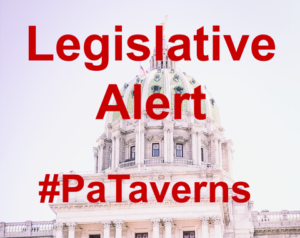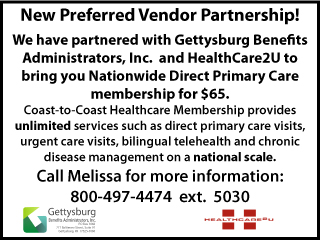Small Business Taverns, Licensed Restaurants Urge Governor To Allow Increased Services In Yellow Regions As They Move Closer To Green
 (May 8, 2020) With 24 Pennsylvania counties moving into Governor Wolf’s Yellow COVID-19 Recovery Phase, struggling family-owned, small business taverns and licensed restaurants today presented Governor Wolf’s office with a recommendation to gradually allow more services at establishments in counties that are now Yellow as they move closer to Green.
(May 8, 2020) With 24 Pennsylvania counties moving into Governor Wolf’s Yellow COVID-19 Recovery Phase, struggling family-owned, small business taverns and licensed restaurants today presented Governor Wolf’s office with a recommendation to gradually allow more services at establishments in counties that are now Yellow as they move closer to Green.
Under Governor Wolf’s current plan, Pennsylvania taverns and licensed restaurants may only provide take-out meals and certain beverages throughout the Yellow Phase as they have been doing in the Red Phase.
“It’s been a difficult road,” wrote Chuck Moran, executive director of the Pennsylvania Licensed Beverage and Tavern Association. “They were the first Pennsylvania businesses ordered to cease operations, and have been deprived of most sources of income for almost eight-week now.”
Moran continued, “All are under enormous economic pressure, and we are concerned that this will cause permanent closures for many.”
The proposed plan encourages Governor Wolf to allow two late Yellow phases, one to take advantage of limited outdoor seating followed later by limited indoor seating. In addition, a number of social distancing and safety requirements would be put in place ranging from table distances, hand sanitizers/hand washing requirements, and table cleaning procedures.
“For my members, particularly those in counties that are now in the Yellow phase, questions are rising about what’s next?,” Moran wrote. “We realize that there’s no timeline except what’s set by the virus, as no one can accurately predict the path of COVID-19. And, we know that both you and Dr. Levine have repeatedly said that reopening Pennsylvania won’t be like flipping a switch and everything returning to normal.”
Moran says financial anxiety for small business, family-owned establishments is at an all-time high based upon phone calls and emails coming into the Pennsylvania Licensed Beverage and Tavern Association.
Furthermore, with Ohio allowing limited outdoor seating on May 15, followed by limited indoor seating on May 22, Moran says taverns and licensed restaurants in Western Pennsylvania will be at a financial disadvantage.
According to a March 2020 study by the National Restaurant Association, Pennsylvania’s restaurant and foodservice industry would lose more than $1.8 billion in sales in April. That same study indicated 96 percent of Pennsylvania restaurant operators had laid off or furloughed employees since the beginning of the coronavirus outbreak.
“We’re all walking a tightrope trying to balance health safety and financial issues,” says Moran. “We need to find reasonable ways to help these small businesses while not causing the COVID-19 curve to head in the wrong direction. Our recommendations provide a way for the state to test health safety concerns within the Yellow Phase while helping small businesses increase financial opportunities.”
Moran says the Pennsylvania Licensed Beverage and Tavern Association offered this proposal after reviewing recommendations and activities in other states, as well as having discussions with members of the association.
The Pennsylvania Licensed Beverage and Tavern Association represents small business taverns and licensed restaurants in the Commonwealth of Pennsylvania. The Association formed after Prohibition in 1941, reorganized in 2019, and today advocates for best practices and rights within the industry as well as best experiences for patrons.
The following was sent to the Governor’s Office on May 8, 2020.
May 8, 2020
SUBJECT: Phased-in Tavern and Restaurant Recovery Recommendations
TO: The Honorable Tom Wolf, Governor
Today, 24 Pennsylvania counties moved from being in the Red phase to Yellow, and hopefully more will transition in the near future. Ultimately, we will get to green. For residents in those counties, the move is a sign of hope and progress in the fight against COVID-19. It also provides people in other counties further encouragement that it can be accomplished.
Congratulations in leading the Commonwealth to this achievement.
The Pennsylvania Licensed Beverage and Tavern Association is the industry representative for small business taverns, pubs, bars, and licensed restaurants. Our Members are primarily family-owned establishments. They are an asset to their communities. They need to survive this pandemic.
It’s going to be a difficult road. They were the first Pennsylvania businesses ordered to cease operations, and have been deprived of most sources of income for almost eight weeks now. All are under enormous economic pressure, and we are concerned that this will cause permanent closures for many.
The National Restaurant Association estimated that the Pennsylvania restaurant and foodservice industry would lose more than $1.8 billion in sales in April. The same study indicated 96 percent of Pennsylvania restaurant operators had laid off or furloughed employees since the beginning of the coronavirus outbreak to early April. (Our members have an average of 17 employees each.)
For my members, particularly those in counties that are now in the Yellow phase, questions are rising about what’s next? We realize that there’s no timeline except what’s set by the virus, as no one can accurately predict the path of COVID-19. And, we know that both you and Dr. Levine have repeatedly said that reopening Pennsylvania won’t be like flipping a switch and everything returning to normal.
With that said, in conversations with my Members, many would like to be prepared for the day when they are allowed to go beyond take-out meals and beverages. Many have offered creative ideas to increase business in a safe and responsible manner that protects both patrons and staff.
We are sharing these ideas with you today, in hopes that you will approve measured interim steps as counties in the Yellow phase move closer to Green.
We fully understand the need for social distancing. Protection of our families, employees, friends and community are our top priority. However, we believe the following ideas would accomplish this while giving economic help and hope to our members in Yellow regions:
Step One – Outdoor Seating – Late Yellow 1 Phase
With warmer weather approaching, establishments with decks, patios, and courtyards could open those outdoor areas as a first step. In addition to the general recommendations below, Step One would permit up to 50% outdoor maximum seating capacity in compliance with the general table distancing rule.
Reordering of food or drinks would require wearing a mask by the patron.
During this step, sidewalk areas that may have regular foot traffic would not be opened to patrons to dine.
For those establishments with parking lots but no previously used outdoor space, allow those establishments to design limited seating in a designated part of the parking lot, following the same rules as decks, patios, and courtyards, and “roped” off with a single entry point.
In order to begin hiring back entertainment and thus providing jobs to struggling singers and musicians, all licensed establishments would be allowed to have live entertainment, with no more than 75 decibels of sound at their property lines (in locations that do not have local noise ordinances). This is consistent with current noise regulations for wineries.
Step Two – Limited Indoor Seating – Late Yellow 2 Phase
With continued improvements in COVID-19 statistics, in addition to outdoor seating under the rules below, allow establishments to begin seating a limited number of patrons inside, following the same rules as outdoors, up to a maximum 50 percent premise occupancy with each table at least 6 feet apart.
Step Three – Green
This step includes a return to full seating capacity; however, staff would still be required to wear masks and schedule regular handwashing until further notice. Similarly, hand sanitizers would be located at entry points and used by all patrons.
When this step is achieved, any non-licensed area permitted in parking lots as part of Step One would be eliminated unless the licensed establishment follows procedures to license those areas.
As a general rule, the following would be observed in Steps 1 and 2:
- All employees would be required to wear masks
- All employees must practice social distancing of 6 feet
- All employees must have regularly scheduled handwashing times, not to exceed hourly
- All table seatings must be at least 6 feet apart regardless of seating capacity limitations
- All tables must be thoroughly disinfected between customers
- No tables would seat more than 6 people; all must reside in the same household
- No salad bars or self-serve buffets would be permitted
- Patrons would get one-time paper menus, or use online menus through personal technology, or have plastic covered menus that are sanitized after each use.
- No table condiments
- No pre-set tables
- Patrons would be seated by reservation only to avoid waiting lines
- Patrons must wear masks when not eating or drinking
- Hand sanitizer must be located near entries, and all patrons required to clean hands for entry and departure
Pennsylvania’s bars, taverns and restaurants have supported Pennsylvania’s efforts to contain and manage community spread of the COVID-19 virus, some at the risk of losing everything they have worked decades to build. These gradual, measured steps would offer our members an opportunity to continue that effort while helping reopen the state’s economy, and giving hope to these businesses and their employees.
We would be happy to discuss this proposal with your staff and the Pennsylvania Liquor Control Board, and to serve as a resource to better inform your decision making. Thank you for your consideration of these proposals.
Sincerely,
Chuck Moran
Executive Director






